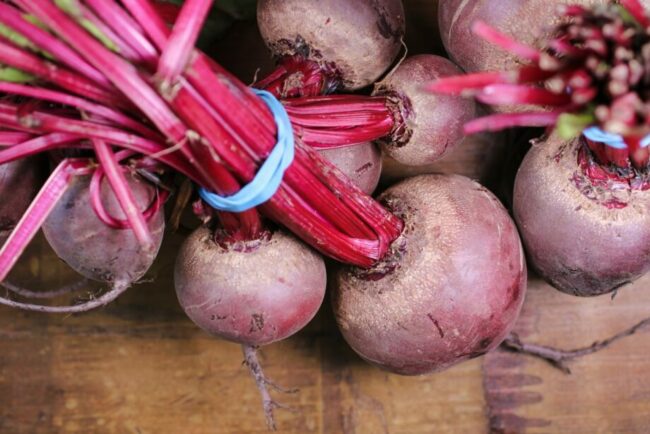Beets, with their vibrant hue and earthy taste, are an exceptional addition to our diet. They pack a nutritionally rich punch, but like all things organic, they do have a shelf life. We often ponder on their freshness, especially if they’ve been out of sight in our kitchens.
Table Of Contents
−- How Long Do Beets Last?
- Beets in the Garden: Their Natural Habitat
- Refrigerating Beets: The Cold Storage Chronicles
- Freezing Beets: The Long-Term Commitment
- Discerning the Freshness of Beets:
- Sprouting Beets: A Cautionary Tale
- Storing Beets: Best Practices
- The Pickled Beet Paradigm
- Near-Expiration Beets: Making the Most of Them
- Conclusion
So, let’s embark on a thorough journey to explore the various facets of beets, ensuring you derive the most value from this incredible vegetable.

How Long Do Beets Last?
Fresh beets, when stored with care and precision, are remarkably resilient. If you place them in your refrigerator without the greens, they’ll typically stay fresh for around two weeks. Interestingly, their shelf life slightly decreases if you store them with the greens. It might come as a surprise, but the greens sap the life out of the beets.
Now, for those of us who don’t always have the luxury of fridge space, room temperature can be an alternative, albeit for a shorter span—3 to 5 days. This duration, of course, varies based on regional temperature. For instance, in tropical regions without air conditioning, the freshness might dwindle faster.
Beets in the Garden: Their Natural Habitat
If you’re someone who’s taken to cultivating beets, understanding their natural storage parameters is essential. Your garden beets can comfortably stay underground as long as the temperatures hover below 30°. Yet, it’s pivotal to harvest them before the spring foliage emerges, signaling the onset of warmer days.
Post-harvesting, while they can grace your pantry for about 3 to 5 days, the skin might become softer, hinting at a slight degradation in their prime quality.
Refrigerating Beets: The Cold Storage Chronicles
The fridge is a haven for beets, but even here, methods matter. For example, beets with their greens still intact can sit in your refrigerator for approximately two weeks. The market often offers beets in plastic bags which can optimize their fridge life. Refrain from washing them until they’re ready for consumption to prevent premature rotting.
For those who fancy canned beets, once opened and stored in the refrigerator, they retain their freshness for about 3 to 4 days, but ensuring they’re sealed in an airtight container is paramount.
Freezing Beets: The Long-Term Commitment
Thinking of long-term beet storage? Freezing can be your ally. But, there’s an art to it. Beets prepared appropriately for freezing can last up to 8 months. The key here is ensuring minimal moisture content to preserve their texture upon thawing. This involves a series of steps: blanching or cooking the beets, then cooling them, followed by cutting, peeling, and finally sealing them in freezer-friendly bags.
Discerning the Freshness of Beets:
Determining if your beets have passed their prime isn’t merely by time reckoning. Several signs can hint at their condition. Cooked beets developing mold or exhibiting a peculiar smell are definite red flags. Fresh beets showcasing rust or mold spots need a thorough inspection.
A small bad patch can be excised, but widespread issues require disposal. If your beets feel soft or overly wrinkled, it suggests dehydration. While not entirely inedible, their culinary performance might be underwhelming.
Sprouting Beets: A Cautionary Tale
Sprouting in vegetables often rings alarm bells. For beets, the greens and sprouts contain heightened levels of solanine, a naturally occurring toxin. Consuming large amounts might be detrimental. If your beets are sprouting, it’s best to remove all the greens. The main beet body, however, remains safe.
Storing Beets: Best Practices
The best approach to beet storage begins even before they enter your kitchen. If you’re buying them fresh, consider snipping off the tops. Why? The greens, while nutritious, tend to leech moisture from the beetroot, hastening its degradation. If you’re refrigerating them, ensure proper ventilation. A plastic bag with holes or even wrapping them in paper towels can strike the right moisture balance.
The Pickled Beet Paradigm
For those looking to diversify their beet consumption, pickling is a delightful option. Not only does this add a tangy twist to their earthy flavor, but it also extends their shelf life considerably. An unopened jar of pickled beets can last anywhere from 12 to 18 months.
However, once opened, their best-by date shrinks, so it’s always good to trust your senses. Any off-putting smell or visible mold means it’s time for them to go.
Near-Expiration Beets: Making the Most of Them
No one likes waste. So, if you notice your beets are nearing their end, consider juicing them. Beet juice, packed with nutrients, can be a refreshing beverage. Alternatively, pickling or even fermenting them can not only rescue them from the bin but also offer a tasty treat.
Conclusion
Beets, with their myriad health benefits ranging from antioxidants to essential minerals, are a must-have in our diet. Understanding their storage, shelf life, and optimal usage ensures we derive maximum value from them.
Whether you’re a gardener, a cook, or just someone who loves beets, this comprehensive guide seeks to cater to all your beet-related queries.

Editorial Staff
Our writers, editors, content managers, and SEO specialist. We all take part in crafting amazing articles. We spend hours ensuring that each article is based on facts, researched, and thorough. You'll never want to click the back button to look for more answers other than here!
